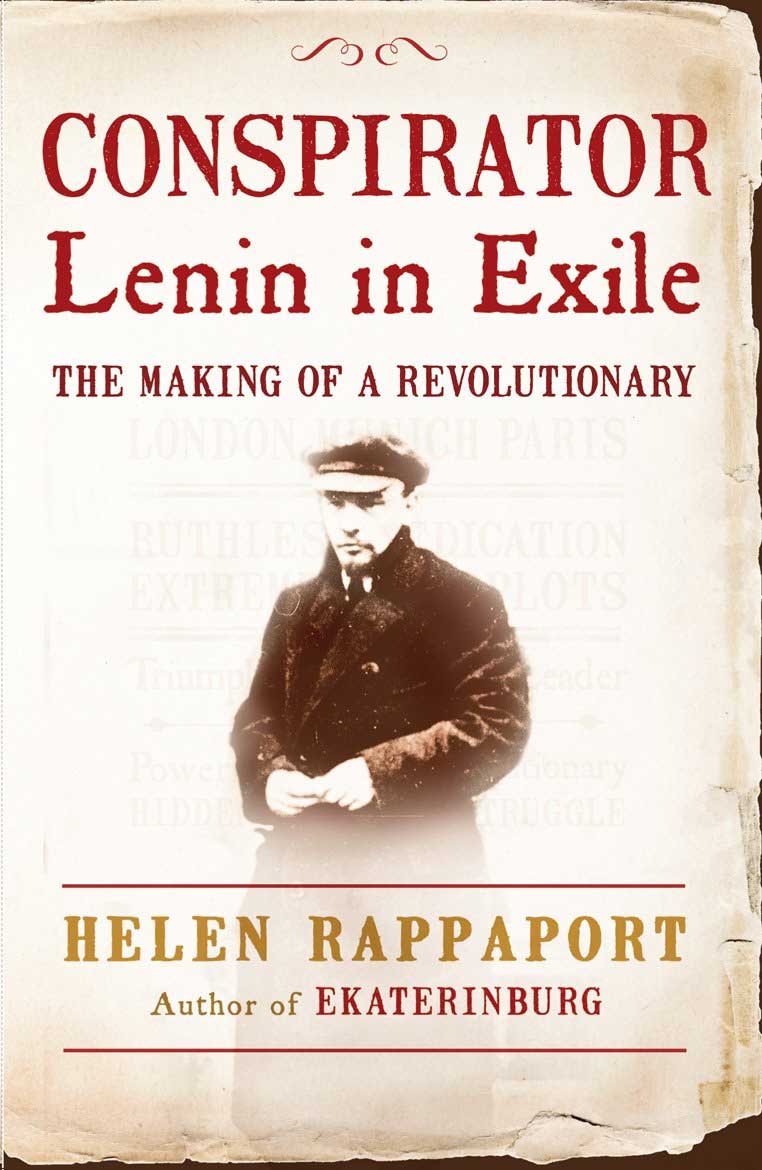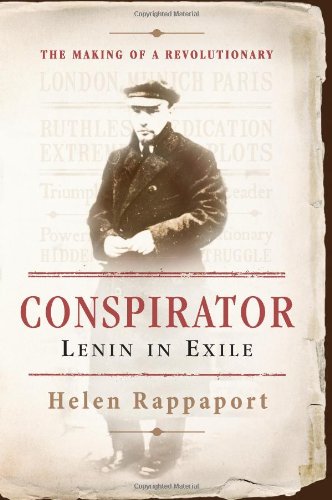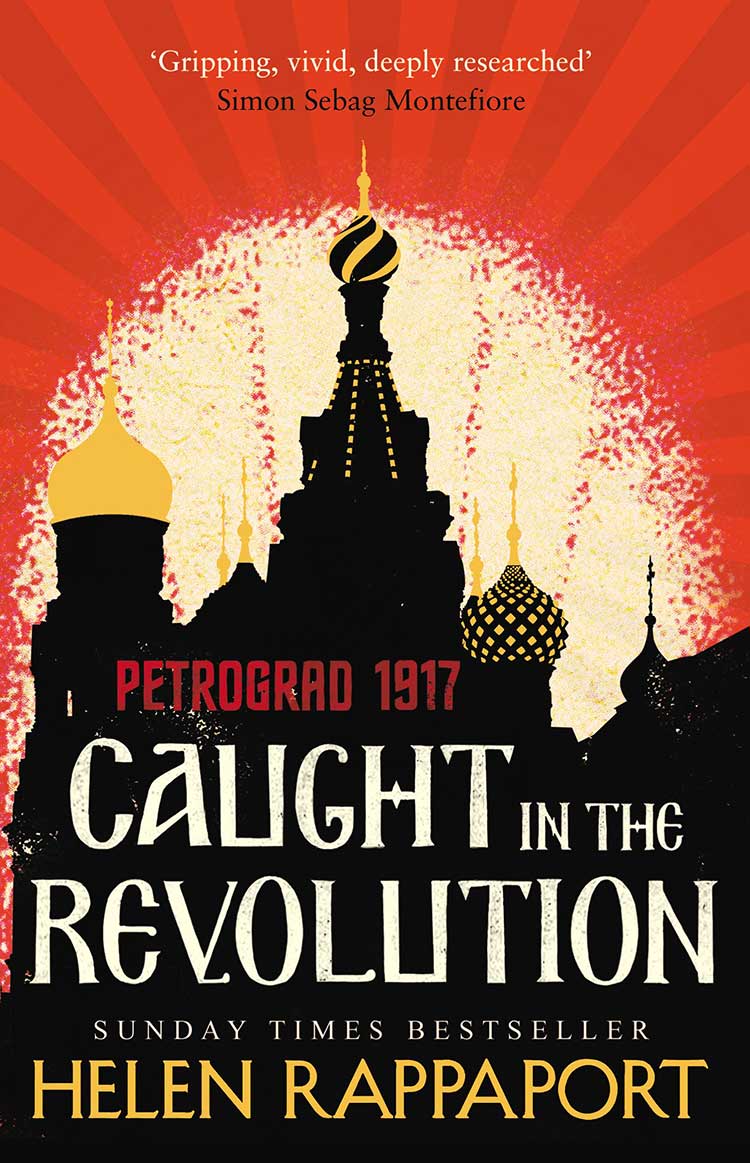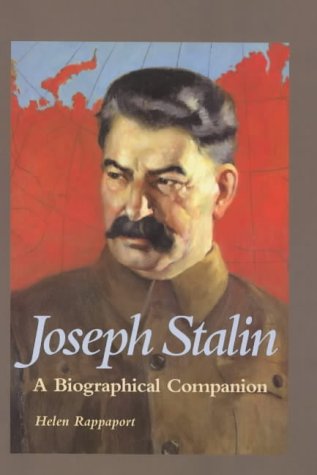Conspirator:
Lenin in Exile
revealing the complex personality of the man behind the bolshevik seizure of power in 1917 and what got him there
“Helen Rappaport presents an exhaustive, almost week-by-week account of this period when the great Bolshevik (at times, almost the only Bolshevik) and his wife Nadya hopped from one European city to another, dodging secret policemen, living from hand to mouth and tirelessly writing, debating, organising, plotting, plotting, plotting . . .”
Roger Hutchinson Scotsman
Conspirator: Lenin in Exile
Conspirator is the compelling story of Lenin’s exile: the years in which he and his political collaborators plotted a revolution that would change 20th century history.
It tells the story of Lenin in the long and difficult years leading up to the Russian Revolution, years that were spent constantly on the move in and around Europe in the company of his loyal and longsuffering wife Nadezhda Krupskaya.
Conspirator strips away the arid politics of Lenin’s official life and reveals the real man, as well as describing his many conflicts, personal and political, with those who shared his exile.
It also looks at the loyal circle of women who unquestioningly supported Lenin, at Russian émigré lives in the enclaves of the cities in they lived and the risks taken in support of Lenin’s vision by the wider network of Russian revolutionaries in the underground movement, both at home and abroad.
About writing Conspirator
In 2008, having written my first book on the Romanovs, I started looking for a new subject, but this time in the revolutionary period. Lenin had always intrigued me but the thought of venturing into the drab and depressing waters of Soviet history seemed a tough call. Lenin was not an easy person to take on: he wasn’t a ‘sexy’ subject like Stalin who had a predilection for robbing banks and having sex with underage girls. Indeed, Lenin came across as a dreary pedant – the archetypal sober, moral puritan. He didn’t drink, didn’t smoke and, so we were led to believe, didn’t have much of, if any, sex life – all in all a subject only for political and academic historians
When I dug deeper, however, I was struck by how little had been said about his non-political life – in as much as it is possible to say he had one – and especially his seventeen long, hard years in exile before his rise to power. The challenge, as I saw it, was to write a book without – as I came to expresses it – ‘all the boring bits’ .
What intrigued me as a historian – and also as a woman and a feminist – was getting to the real man behind the iconic, public image. I wanted to know more about the sheer logistics of how and where he and his wife had lived in Europe: what kind of accommodation did they have in London and Zurich for example; what did they do for money; what did they eat? What were Lenin’s relationships like with his fellow exiles and especially the women in his life?
At the end of a fascinating journey in Lenin’s company across Europe – including research trips to Finland, Russia and Poland – I can’t say that he ever became a hero to me, but I did find him compelling, at times utterly infuriating if not repellent, but always endlessly fascinating.
Helen talks about Conspirator in an interview with Blackwell Books.
Reviews
“Vivid … Lenin’s ruthless determination to seize power in October 1917 probably owed much to his awareness that he had but one chance to escape the world of paranoia and conspiracy in which he had operated for so long, and that Rappaport evokes so successfully.”
Nick Rennison Sunday Times
“Pretty much essential reading for anyone interested in Russian history”
Scott Pack
“In Helen Rappaport’s vivid account, we finally have a worthy counterpart to Simon Sebag Montefiore’s Young Stalin“
George Eaton New Statesman
“A magnificent book… Rappaport’s account of his earlier, often neglected decades is well researched, fluently written and something of a triumph”
The tablet
You may also like:
Latest Articles and Media about Lenin & the Russian Revolution
Lenin in London
Most people know the now legendary tale of how Lenin returned to Russia after many years in exile on a sealed train across wartime Germany, arriving at Petrograd’s Finland Station on 16 April 1917. But few are aware of the life he led in Europe between 1900 and his dramatic return. During those years he came to London on five separate occasions…
John Reed: Writing the Russian Revolution
John Reed was the archetypal rebellious romantic. He was made for revolution and hungry for a cause and the Russian Revolution found its most passionate American advocate in him
Mariya Bochkareva and the Petrograd Women’s Death Battalion
“Since our men are hesitating to fight, the women must show them how to die for their country and for liberty…” In May, in Petrograd, Mariya Bochkareva held a mass recruitment rally for the Women’s Death Battalion.
The Women in Lenin’s Life
Lenin had no qualms whatsoever in ruthlessly exploiting the loyalty of the women who formed his essential back up team. He wore them all ragged in the cause of his own political ends.







